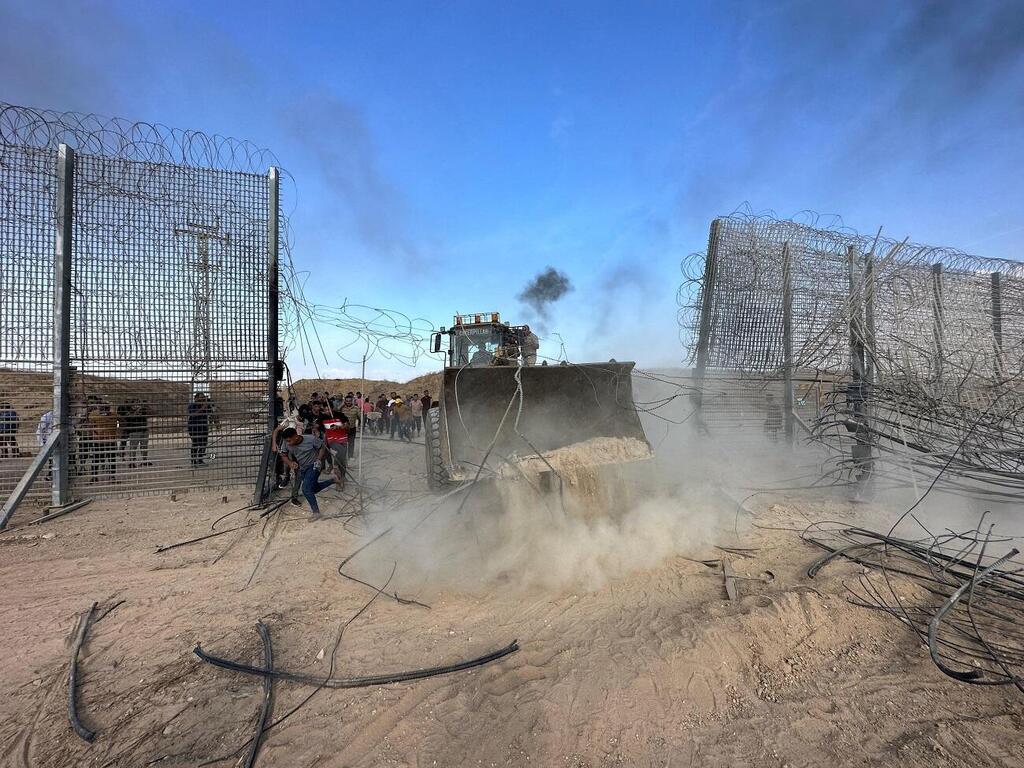Getting your Trinity Audio player ready...
Ten days before Hamas launched its devastating attack on October 7, an Egyptian intelligence official called me, urging me to relay an important warning. “Something big is about to happen in Gaza,” he said, explaining that Egypt had informed Prime Minister Benjamin Netanyahu's office of the imminent threat. “We warned Prime Minister Netanyahu that something catastrophic was going to happen within days from Hamas against Israel,” the official added.
He didn’t clarify whether the warning was delivered directly to Prime Minister Netanyahu or passed through one of his aides, but his point was clear: Israel had been warned. Yet, the Israeli response was perplexing. The official shared that Israel appeared unconcerned, quickly shifting focus to the unstable situation in the West Bank.
2 View gallery


Egyptian President Abdel Fattah El-Sisi and Prime Minister Benjamin Netanyahu
(Photo: AP, GPO, Marc Israel Sellem)
The Egyptian official did not specify who received the warning, but after publishing his statement, I saw a similar warning echoed by outlets like The Associated Press and The Financial Times. Shortly afterward, U.S. Congressman Michael McCaul, Chairman of the House Foreign Affairs Committee, made similar remarks. "A representative from Egyptian intelligence informed me that Hamas was preparing something catastrophic against Israel," he said. "I don’t know what happened with our intelligence agencies and Israeli intelligence that they missed this sharp warning."
Get the Ynetnews app on your smartphone: Google Play: https://bit.ly/4eJ37pE | Apple App Store: https://bit.ly/3ZL7iNv
McCaul was direct, but his comments were not without merit. Evidence soon emerged showing that the October 7 attack had been planned for at least a year. And in Israel, it was revealed that Hamas had been training its fighters near the Gaza border for at least two years to avoid detection. Meanwhile, Israel’s surveillance, despite heroic reports from its scouts, missed the threat altogether. These warnings had been there, but they were ignored.
When I spoke with the Egyptian official, I was assured that the intelligence provided to Israel had always been reliable, and I had no reason to doubt the information. I trusted it enough to publish it, knowing it could be verified. Foreign media outlets did the same, citing the same sources.
Weeks after my initial report in Yedioth Ahronoth, I received a call from a senior official in Israel’s State Comptroller’s Office. She told me she was part of a team gathering evidence for a parliamentary inquiry and asked for a detailed account of how the Egyptian warning had been passed to me. I shared everything I knew. Yet, to my astonishment, the military investigations published last week made no mention of the Egyptian warning. While it’s possible the warning appears in confidential sections of the report, its absence from the public sections raises serious questions.
The key question now is: why was it so important for Egypt to inform Israel, only to face indifference? Why did Israeli officials ignore the warning? And, perhaps most importantly, why did Israel fail to take it seriously?
Meanwhile, in two days, a summit of 22 Arab nations will convene in Cairo, focusing on Gaza. The agenda is already set, but all eyes will be on the summit’s guest of honor: Syria’s new president, Ahmad al-Jolani, who has yet to make a mistake against Israel. At the same time, Egyptian media is framing Egypt as preparing for war, with Israel as the enemy.
The country’s growing military buildup has sparked concerns. General Ahmed Safi al-Din, head of Egypt’s training program, clarified that Egypt’s increasing armament is meant to safeguard regional peace and stability, not to harm neighboring countries. Still, in Israel, there is growing unease.
 Smadar PerryPhoto: Yariv Katz
Smadar PerryPhoto: Yariv KatzOutgoing IDF Chief of Staff Lt. Gen. Herzi Halevi recently remarked, “Egypt has a large army with advanced weapons. Right now, it’s not a threat, but the situation could change in an instant.”
The situation in the region remains precarious. The missed warning from Egypt serves as a stark reminder of the dangers of complacency and the consequences of underestimating the risks surrounding Israel. As tensions mount, one can only wonder how many more opportunities will be missed before the next crisis unfolds.


